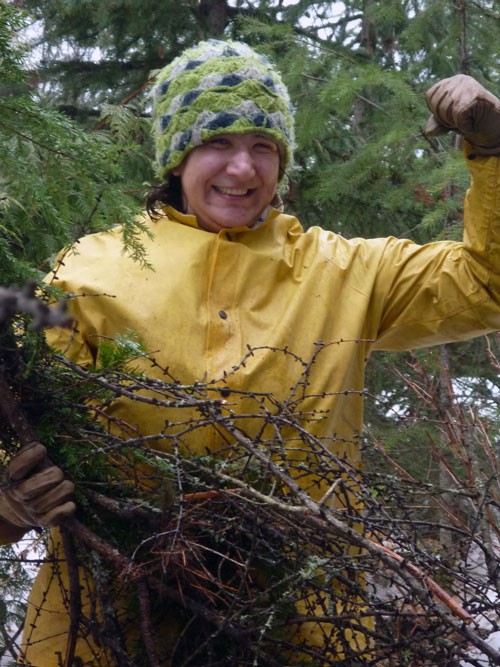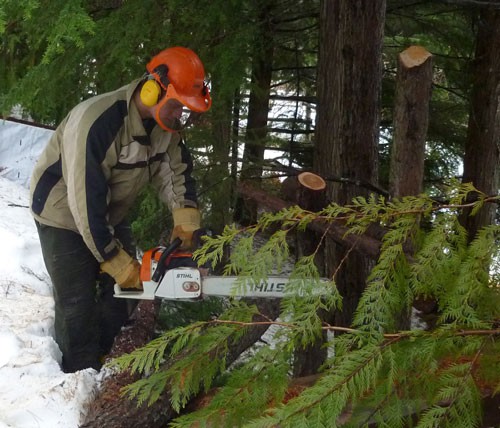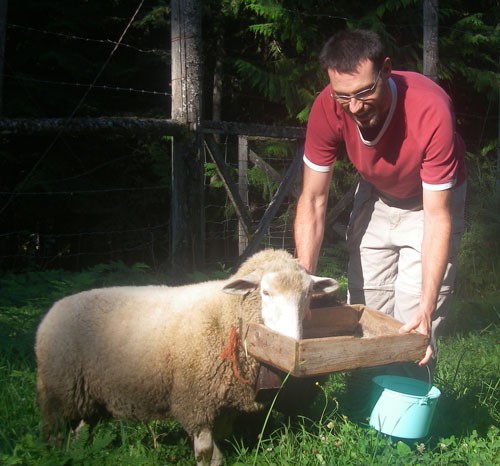
That summer, each day began with milk and honey. Milk came from the goats in the lower field. Honey came from the neighbour’s bees. I was 24 years old. I had read books about agriculture. I had taken university courses in environmental studies and geography. Now I found myself apprenticing on an organic farm in British Columbia’s Fraser Valley. For the first time, farming made sense. The dazzling interconnections that farming embodies have to be experienced to be understood. Here was a dizzy kaleidoscope of bees and weeds and goats and manure and honey, all parts of a whole. Farming, in my experience, is too rich, too complex, too full of pleasure and agony to be learned from a distance. You need to wade ankle deep into mud, gorge on warm berries, toss bales until your fingers bleed. Farming as an art is interconnected and complex and requires a method of instruction that reflects this essence.
In earlier generations, children learned farming from their parents. Watching, listening, helping – young people picked up skills by osmosis. The situation today is different. According to the 2006 census, the average age of a Canadian farmer is 52 years old. As the farming population rapidly ages, the increasingly urgent demand for new farmers cannot be met by former farm kids alone. Many of tomorrow’s farmers were raised in cities and do not have agricultural backgrounds.
College and university programs, such as Kwantlen Polytechnic University’s new bachelor’s degree in sustainable agriculture and the University of Guelph’s organic agriculture program, have begun to spring up in response to this growing demand. But an increasingly popular option for future farmers and market gardeners is direct, experiential education. As far as careers go, farming is all-encompassing. To farm effectively, one must observe and participate in the cycles of nature. An appropriate education in agriculture must include a personal introduction to these elements. The ideal training provides the learner with a glimpse of farming as a complex, vibrant lifestyle.
There are numerous opportunities for direct, experiential education in agriculture. The WWOOF program, the SOIL apprenticeship program and Ontario’s CRAFT program are all examples.

The World Wide Opportunities on Organic Farms (WWOOF) program aims to connect individuals interested in organic agriculture with farmers or gardeners in need of help. WWOOF hosts agree to provide meals and accommodation in exchange for a volunteer’s labour. Canada’s WWOOF hosts are a diverse group: urban and rural, commercial farmers and backyard gardeners. The program is geared toward short-term stays, which B.C. host Uli Holtkamp cites as part of the program’s appeal. “Usually WWOOFers don’t stay that long. People can go to different places and see different ways of doing things. They can pick what fits them.”
The Stewards of Irreplaceable Land (SOIL) apprenticeship program offers would-be farmers a more intensive learning opportunity. Participating farmers commit to actively sharing their knowledge. Apprentices stay for at least two months and often for the full growing season.
Ontario’s Collaborative Regional Alliance for Farmer Training (CRAFT) offers a similar apprenticeship experience. CRAFT Ontario is a network of farms that offer internships in ecological farming. In addition to hands-on practical experience, CRAFT offers participants the opportunity to take part in workshops and field trips.
Sean Hennessey and Uli Holtkamp are WWOOF hosts and have been welcoming volunteers to their British Columbia homestead for almost 20 years. Hennessey and Holtkamp find that volunteers come for a variety of reasons. Some are travellers looking for a cheap place to stay. Some are visitors from foreign countries wanting to experience the “real Canada.” But most are also motivated by a desire to acquire skills in farming and self-sufficiency. Hennessey notes that, in addition to providing practical skills, WWOOFing can offer a new way of thinking. “The education thing is more than learning about gardening. It is about learning that it is possible to survive as a farmer.”

At the Hennessey-Holtkamp homestead, WWOOFers get a direct and tangible experience of farm life. Each day is full of opportunities for learning. A trip to the chicken coop could spark a conversation about mites or manure. Holtkamp shares his decades of gardening experience “just by doing things together and constantly explaining. Every little thing you do around the garden or house brings up something to talk about.”
Jordan Marr, who was introduced to farming through a SOIL apprenticeship, knows the value of hands-on experience. When he first signed up as a SOIL apprentice, he had no intention of becoming a farmer. He was fresh out of university and took a placement at a Nova Scotia organic beef farm as a way to gain perspective on his studies. The experience was life changing, and he signed up for a second apprenticeship the following year. “The major reason I went back a second year is because by then I was serious about being a farmer.”
Today Marr and his partner operate a small-scale organic vegetable farm in Peachland, B.C. Marr credits SOIL with igniting his passion for farming and with giving him tangible skills. “It is the hands-on practical skills that are essential. You can’t go to a university to learn how to farm.”
Farming is intense and dirty and beautiful. The exhaustion of carrying water lines in July sun, the flavour of the season’s first tomato, the satisfaction of harvest – all of these must be experienced to be understood. For people who want to learn by doing, the opportunities are abundant.
Learn more!
WWOOF (World Wide Opportunities on Organic Farms)
Volunteer opportunities on Canadian organic farms
SOIL (Stewards of Irreplaceable Land)
Long-term apprenticeships on Canadian farms
CRAFT Ontario (Collaborative Regional Alliance for Farmer Training in Ontario)
Long-term apprenticeships on Ontario farms
Linnaea Farm ecological garden program
Small-scale organic gardening education
Kwantlen Polytechnic University
Institute for sustainable horticulture
Nova Scotia Agricultural College
Certificate of specialization in organic agriculture
University of Guelph
Organic agriculture program






